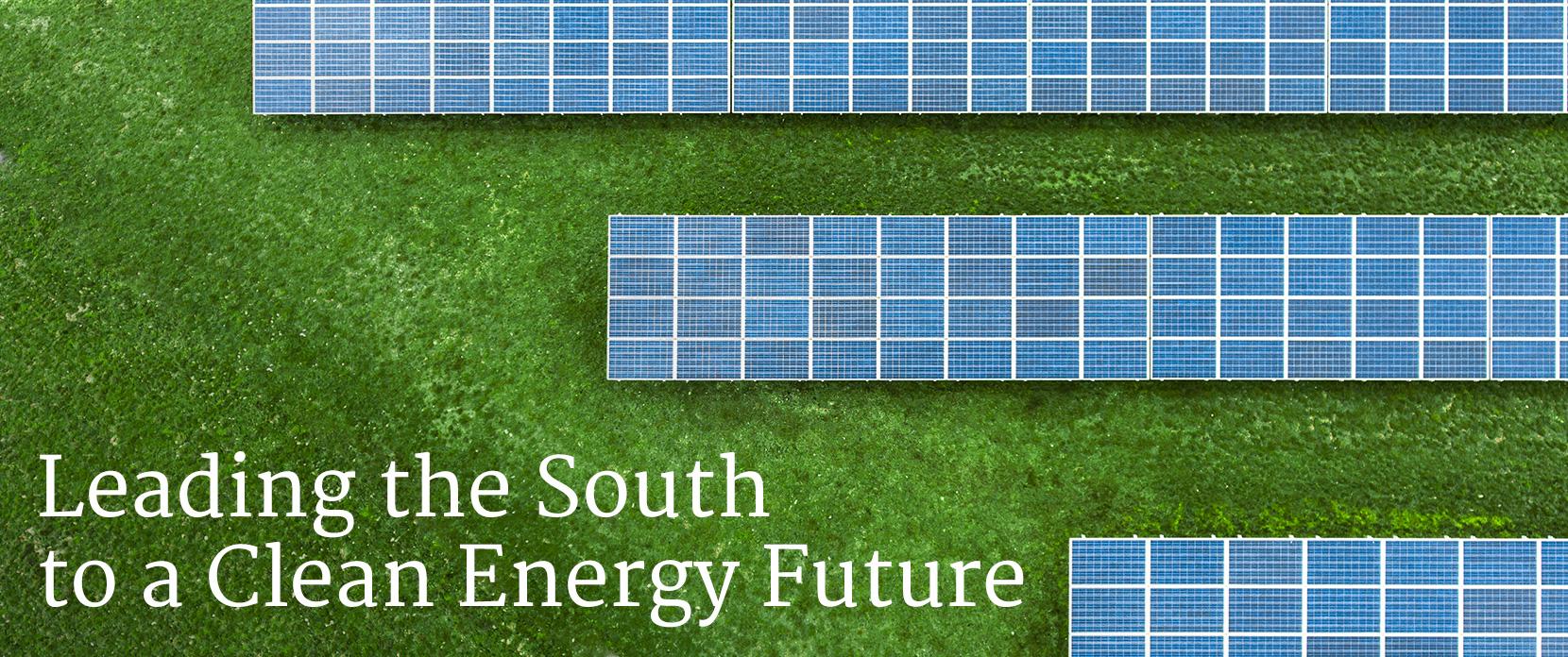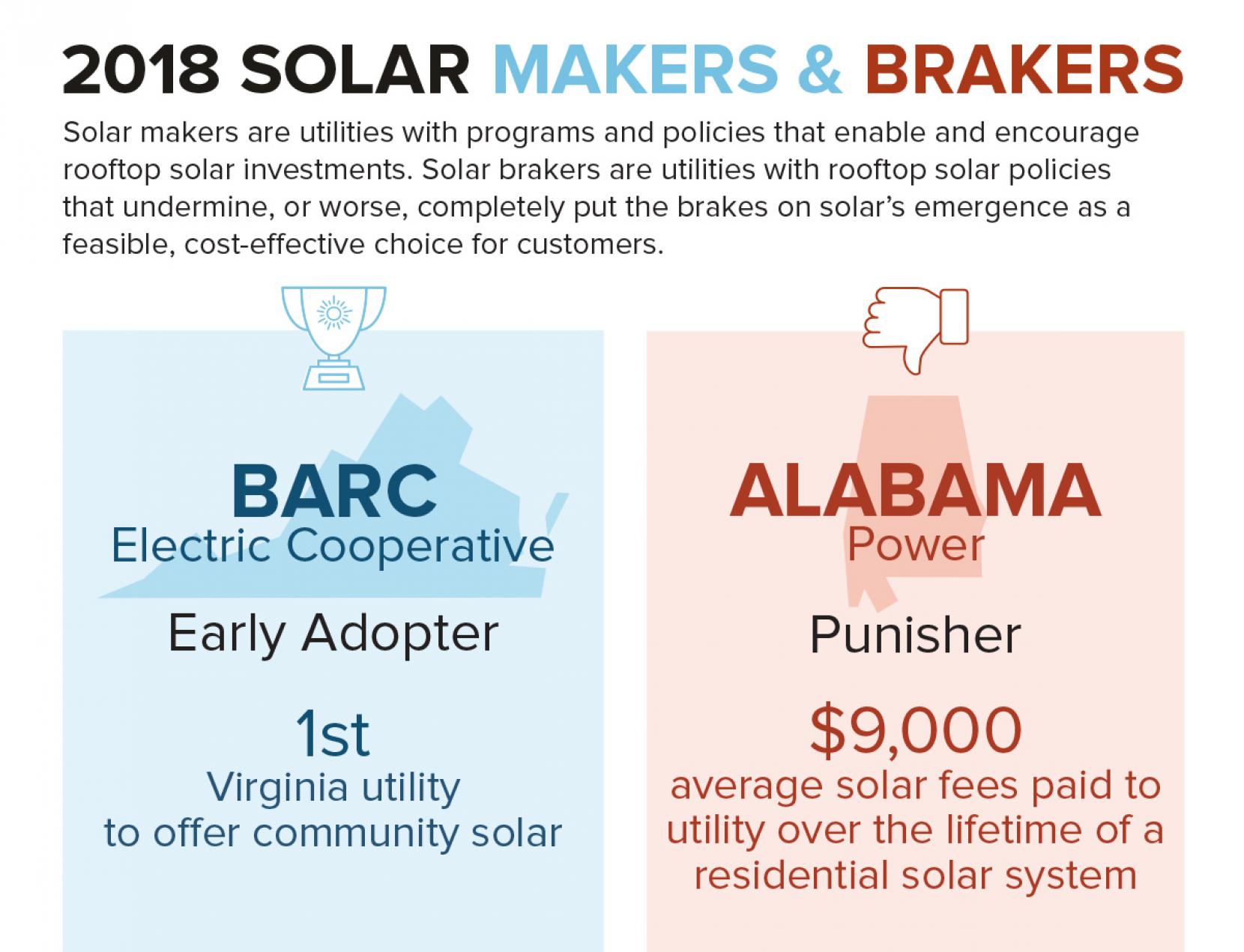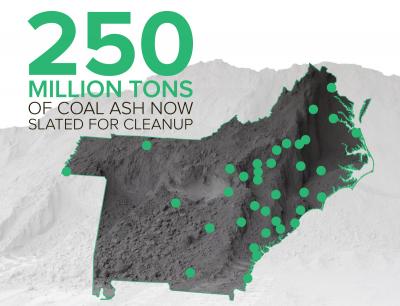SELC goes Above & Beyond to protect our health and environment
This has been an impressive year of results, even by the Southern Environmental Law Center’s historically high standards. Our solar initiative is ending 2019 with 11 gigawatts of solar installed or committed in our six states. Our coal ash warriors have now compelled the cleanup of 250 million tons of toxic sludge. Trump’s damn-the-torpedoes attempt to open the South Atlantic to oil and gas drilling is now on indefinite hold. All construction on the Atlantic Coast Pipeline has been halted since December of last year. And SELC litigation has held corporate giants like DuPont spinoff Chemours and Drummond Coal accountable for knowingly harming our health and environment.
Despite the crazy upside down world we all seem to be living in, SELC attorneys and communicators are demonstrating time and again that science does indeed still matter, that facts can carry the day, and that decision-makers can be convinced to do what’s right and responsible. Through smart long-game strategy and bold place-based actions, SELC is driving environmental law and policy at the national level, as well as throughout our beloved region—at a time when it’s never mattered more.
On behalf of the SELC staff and board, profound thanks to all our friends and supporters who helped achieve these milestones. We hope you feel both proud of all you have accomplished and energized to continue partnering with us in all the urgent work that lies ahead.
Atlantic Coast Pipeline: An Audacious Litigation Strategy That’s Working
When Dominion Energy and Duke Energy announced plans in 2014 to build a destructive, unnecessary 600-mile fracked gas pipeline through the heart of the Southern Appalachian Mountains, SELC attorneys set out to achieve what seemed nearly impossible—stopping an interstate pipeline. For decades, U.S. energy policy has stacked the deck in favor of big utility companies building massive projects, and in 2017 the new Trump administration made things worse when it cast aside environmental concerns to fast-track agency approvals for the Atlantic Coast Pipeline with incomplete, defective analysis. We knew our opposition would have to be sophisticated and robust in order to oppose the inertia of business as usual for two of the nation’s largest energy companies.
The case against the Atlantic Coast Pipeline
We developed an audacious three-front strategy to uncover the truth about the Atlantic Coast Pipeline in the courtroom, in front of state regulators, and in the court of public opinion. After filing eight federal lawsuits challenging defective permits, convincing Virginia regulators to reject the inflated data driving Dominion’s long-range energy plan, and unearthing and communicating compelling facts to raise bipartisan public opposition across the region—our strategy is working. SELC’s litigation has invalidated five necessary permits, Virginia regulators have ruled that Dominion has no need for additional pipeline capacity right now, and political leaders from both sides of the aisle are publicly opposing this boondoggle. Construction along the entire route has been halted since December 2018, and today the pipeline is less than six percent complete—with no construction to date in Virginia.

We are still facing huge obstacles. Corporate lobbyists are working in Congress to get the developers a free pass, and the Trump administration helped convince the U.S. Supreme Court to review one of our key courtroom victories. But our success to date has been remarkable, and we will double down on presenting the facts on the ground and using the power of the law to stop this behemoth once and for all.
People Power
Learn about two of the people leading SELC’s efforts to go Above & Beyond — Executive Director Jeff Gleason, who took the helm April 1, and Senior Attorney and environmental justice advocate Chandra Taylor.
SELC Prepares for an Epic Clean Water Battle
In deference to its friends in the corporate world, the Trump administration has developed a three-part strategy to gut the nearly 50-year-old Clean Water Act, let polluters off the hook, and return our nation’s waterways to a disgraceful era of ignorance and neglect. After victory in the first round, SELC is back in federal court challenging the second volley aimed at our nation’s core clean water safeguards.
This administration might not care whether we have access to clean water, but the rest of the nation does.
Senior Attorney Blan Holman, Leader of SELC’s Clean Water Defense Initiative
In 2019, EPA’s opening gambit tried to suspend the Clean Water Rule, adopted in 2015 to clarify strong protections for wetlands and smaller streams under the Clean Water Act. SELC challenged that proposal in federal court, and we won a nationwide injunction in August 2018 block the suspension rule. Now the administration is proposing two more drastic steps to repeal and replace the Clean Water Rule. If successful, these proposals would remove protections from millions of acres of wetlands and sources of drinking water supplies for more than 32 million people across the Southeast.

SELC is fighting these efforts with a comprehensive initiative that marshals the best science, clear public education, and the power of the law. We have demonstrated the practical impact of the complicated replacement proposal on the waters and wetlands within our six states. We have alerted our broad network of regional partners about the imminent threat to clean water where they live. And we generated more than 20,000 comments in opposition to the proposal. Drawing on our attorneys’ unmatched Clean Water Act experience and expertise, we also submitted our own comprehensive comments (joined by 80 regional and national partners) showing how science and the law agree that EPA’s proposal would be disastrous for our nation’s waters.
Still, the administration seems determined to move ahead. On October 22, EPA finalized its repeal rule, and SELC filed suit the next day in federal court to challenge this action. We expect the replacement rule to be finalized by early 2020, and we are ready to challenge it in federal court as well. There is a long road ahead in defending the Clean Water Act, and we are prepared to march all the way to the U.S. Supreme Court if necessary to stand up for our nation’s bedrock clean water law.

Georgia Energy Plan Opens Door to Renewables
In recent years, Georgia Power has resisted fully embracing clean, cost-saving, renewable forms of energy while pouring enormous sums of ratepayer money into massive, quixotic projects like the troubled Vogtle nuclear expansion. But in the utility’s 2019 long-range energy plan, SELC helped to convince state regulators to crack open the door to a different energy path for Georgians. We used a strategic, web-based outreach campaign to raise the profile of Public Service Commission decision-making in Georgia and inspire residents to lean on their commissioners to do the right thing. At the end of the day, the Commission ordered Georgia Power to develop enough new solar to power 225,000 homes and to increase their programs to support more energy-efficient homes by 15 percent.

Affordable Solar for All
Solar power is not a wealthy person’s resource, but many utilities in the Southeast are working hard to keep solar artificially expensive and prop up the fiction that generating clean, renewable energy at home is a luxury only the richest can afford. Late last year, SELC launched our Rates of Solar website to bring these unfair solar policies into the light of day. The site provides clear, easy-to-understand information on solar policies for more than 400 utilities across our region, and it helps customers connect with their utility to demand reforms that will level the playing field and lower costs for rooftop solar. This year, the site drove a digital campaign that successfully pressed the municipal utility in Oxford, Georgia, to abandon its sky-high solar fee, and Cartersville and Norcross recently announced similar changes.
Protecting Southern forests from the biomass industry
As governments look to lower carbon emissions, misguided efforts to generate cleaner electricity by burning wood pellets are threatening southeastern forests and increasing the logging of carbon-absorbing trees, adding to rather than reducing CO2 in the air. Ten-year-old European policies have subsidized biomass generation to help nations hit renewable energy targets—but policy-makers and the public were not aware that biomass plants would be fueled by wood pellets produced from mature, whole trees in the U.S. In 2016, supplying the U.K.’s demand for biomass required harvesting approximately 117 square miles of forests in the Southeast—an area over 1.5 times the size of Washington, D.C. Last year, by educating policy-makers, SELC and partners succeeded in curbing the U.K.’s two largest future subsidy programs that drive wood pellet demand, and we are making progress convincing Virginia and North Carolina that biomass should not count as a clean energy resource in their new carbon reduction plans.
New Legislation Keeps South Carolina Solar Booming
In 2014, SELC built broad support in South Carolina for legislation that made rooftop solar affordable—and the industry exploded over the next four years with 10,000 new installations and 3,000 clean energy jobs. Many of the provisions driving the revolution began timing out in 2019, so SELC again generated broad backing for the Energy Freedom Act. This unanimously-passed legislation extends solar progress in the Palmetto State, commits to making solar more affordable for customers of little financial means, and brings utility energy planning under state regulation for the first time ever.
Sign Up for SELC News
250 Million Tons of Coal Ash Slated for Cleanup
Since 2011, SELC has pushed states in our region to fully address the dirty legacy of coal-fired power. Thanks to two major victories in 2019, utilities in the Southeast are now slated to clean up more than 250 million tons of toxic coal ash from leaking pits on the banks of major waterways.

Virginia enacted historic legislation requiring Dominion Energy to excavate all 28 million tons of coal ash in the Chesapeake Bay watershed. SELC’s unprecedented 2017 federal court victory against coal ash pollution at Dominion’s Chesapeake site uncovered the critical facts driving this law. And when that ruling was overturned on appeal, we rallied partners around the goal of bipartisan legislation that would mandate decisive action. In the end, even Dominion was forced to back this deal, which passed with a near-unanimous vote. According to the new law, the first of its kind in the nation, the utility must recycle at least 25 percent of the ash and move the rest to safe, lined storage.
After years of SELC advocacy, North Carolina ordered Duke Energy to remove over 90 million tons of coal ash from unlined lagoons at the utility’s six remaining storage sites. As a result of SELC’s litigation and public education efforts, Duke Energy’s eight other coal ash pits were already designated for cleanup by legislation, court orders, and settlements. This latest order completes a clean sweep of the company’s 14 sites in the state. Duke Energy quickly announced it would fight the state’s order, and SELC has been granted permission to join the case and help defend the cleanup requirement in court.
Meanwhile, we are opposing Trump EPA efforts to weaken the federal Coal Ash Rule, and our work in the Southeast has provided important real-world examples to strengthen this effort.
More 2019 SELC Stories
ALABAMA ABANDONED MINE POLLUTION RULED ILLEGAL
NEW WILDERNESS AREAS IN TENNESSEE
GENX SETTLEMENT PROTECTS DRINKING WATER FROM INDUSTRIAL TOXINS


